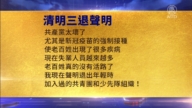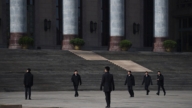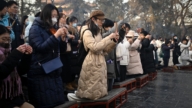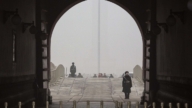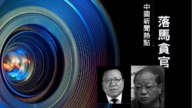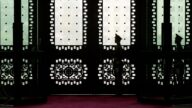【新唐人2014年09月19日訊】中共中紀委17號下午宣佈:內蒙古自治區黨委常委、自治區副主席潘逸陽,涉嫌嚴重違紀違法,目前正接受調查。大陸媒體報導,潘逸陽的腐敗問題可能和礦產有關。他也是繼原內蒙古統戰部部長王素毅後,落馬的第二名內蒙古省部級官員。請看詳細報導。
潘逸陽是第五位落馬的十八屆中共中央候補委員。此前,四川省委原副書記李春城,原中國石油天然氣集團公司副總經理王永春,廣東省委原常委萬慶良,山西省委原常委陳川平等四人,已相繼被查。
而就在潘逸陽落馬的前一週,9月10號,內蒙古金融投資集團黨委書記王振坤、內蒙古自治區農村信用聯合社主任武文元,於同一天被宣佈調查。
潘逸陽曾在江西任省委常委,並兼任贛州市委書記7年,期間他力主稀土資源重組。2010年後,潘逸陽調任到中國另一大稀土主礦區內蒙古,分管財政金融等領域。2014年,當地調整官員的工作分工後,他負責綜合經濟管理、對外開放等方面。
大陸媒體報導,潘逸陽的落馬和礦產資源領域的腐敗有關。
早在去年9月,中共第四巡視組就指出,內蒙古在礦產資源配置、工程招投標等領域,腐敗問題比較突出。同一時間,中共第八巡視組針對江西點名,有些地方在礦產資源保護、開發、管理工作中存在漏洞。
據了解,江西贛南的稀土礦以輕、中、重含量齊全而聞名,是中國有色金屬基地之一,有「稀土王國」之稱。而內蒙古已建成中國乃至世界最大的稀土產業基地,從稀土選礦、冶煉、分離、科研、深加工到應用,已形成完整的產業鏈條。
大陸時政觀察人士華頗:「按道理說,如果哪個國家和地區擁有了寶貴的資源,這個國家的人民很富裕。但是在中國變了味了。這些寶貴的利益被既得利益集團,跟那些權貴們所壟斷。這些利益鏈的利益非常豐厚,我想他主管這方面,肯定要分得一杯羹。他只是在前臺,背後還會有人。」
此前,海外媒體曾流傳,中共現任政治局常委、主管宣傳的劉雲山家族,在內蒙古掌控了大量礦產資源的所有權,包括煤礦、鉬礦等。劉雲山從小在內蒙古土默特右旗長大,1968年從集寧師範畢業後,長期在內蒙古任職,一直到1993年才離開內蒙古進京。
2010年10月16號,劉雲山曾題詞祝賀內蒙古敕勒川文化研究會成立。該研究會由原內蒙古自治區常委、統戰部部長王素毅揭牌。王素毅今年7月因受賄罪被判無期徒刑。
2011年,劉雲山主管的中宣部,還把內蒙古巴彥淖爾市的軍地理論宣講工作,列入所謂的十大「理論宣講先進集體」之一。
大陸時政觀察人士華頗:「這方面不單是劉雲山家族裡,也得有曾慶紅家族。曾慶紅就曾經去南非考察過,說要從南非引進這個項目,這項目已經引進了。把子孫應該繼承的巨大的礦藏,他們全都給掠奪了。普通老百姓受到了環境被破壞的苦果。」
2004年6月底,時任中共國家副主席的曾慶紅,訪問南非。期間他強調:雙方在「能源、礦產」等領域的合作,「富有成效」。據官方數據顯示,2004年南非向中國出口的商品,多為「礦產品或其製品」。
此外,據海外媒體曝光,原內蒙古黨委書記儲波的兒子儲慧斌,通過倒買倒賣內蒙古的礦產資源,牟取暴利。在中紀委介入調查後,儲慧斌將內蒙古鄂爾多斯的價值幾億的一個煤礦,送給了曾慶紅的兒子曾偉(維),調查的事就此平息。
大陸獨立專欄作家劉逸明:「以前中共高層是每一個政治局常委都有他的利益鏈條,而且是從上到下,他就處於這個利益鏈最頂端,因為彼此都有問題,所以就你不查我,我不查你。」
由於中共官方的過度挖掘,造成內蒙古草原快速退化。有數據顯示,早在2006年,全區荒漠化的土地已達總土地面積的近60%,沙化面積也達總土地面積的40%。當地牧民對當局這種「斷子孫路」的方式極其憤慨,他們在上訪無效後,有些人甚至用身體擋住那些開釆車或運煤車,結果有多人被活活碾死。
採訪編輯/唐音 後製/陳建銘
Inner Mongolia Vice Chair Sacked over Mineral Resources
The vice chairman of the government of Inner Mongolia autonomous region, Pan Yiyang, was recently investigated over allegations of a serious disciplinary violation, according to the CCP’s central discipline organ. Mainland media say the case is related to the mining industry; Pan is the second Inner Mongolian ministerial-level official to be sacked following the downfall of Wang Suyi, the former head of the united front work department.
Along with four other members of the CCP central committee Li Chuncheng from Sichuan, Wang Yongchun from Petro-China, Wan Qingliang from Guandong, and Chen Chuanping from Shanxi—Pan Yiyang is the fifth to be sacked.
One week before his dismissal, two other Inner Mongolian officials, Wang Zhenkun and Ren Wuwen, were investigated.
Pan Yiyang had been in Jiangxi and Ganzhou for seven years, advocating the restructuring of rare earth resources. In 2010, he was transferred to Inner Mongolia, another major rare earth mining area in China, leading the financial fields. In 2014, he was put in charge of comprehensive economic management and development, after the reorganization of the local government.
Mainland media say Pan Yiyang was involved in corruptionover mining resources.
The fourth inspection team had criticized the prominence of corruption in Inner Mongolia, over the allocation of mineral resources and bidding, as early as last September. The eighth inspection team then targeted Jiangxi’s loopholes in mineral protection, development and management.
Jiangxi Gannan is known as one of China’s non-ferrous metal mining sites and a “rare earth kingdom" for its complete mines of light, medium and heavy-content rare earth metals. Inner Mongolia has become the largest site in the rare earth mining industry, in China and in the world. It has formed a complete industrial chain for rare mineral processing, smelting, separation, research and application.
China politics watcher Hua Po: “People in a country or region that has valuable resources should lead wealthy lives."
“But it’s not the case in China; people with vested interests and dignitaries monopolize precious valuables."
“The wealth passed down the interest chain is enormous; I believe Pan Yiyang must have had a slice of the pie as the leader in the area—he was just one person at the front, but there must have been more behind the scenes benefitting."
Foreign media have previously reported that the family of the incumbent Politburo Standing Committee, Liu Yunshan, controls a large number of Inner Mongolian mineral resources including coal and molybdenum-ore.
Liu Yunshan grew up in Inner Mongolia and after graduating from Jining University in 1968, he served in Inner Mongolia until 1993, before leaving for Beijing.
On Oct. 16, 2010, Liu Yunshan congratulated the founding of the Inner Mongolia Chile Culture Research Association, which was also inaugurated by Wang Suyi, from the standing committee of Inner Mongolia. Wang Suyi was sentenced to life imprisonment in July, for taking bribes.
The head of the central propaganda department, Liu Yunshan began including Inner Mongolian military theory in 2011, as one of 10 advanced groups of theories publically taught.
Hua Po: “Both Liu Yunshan and Zeng Qinghong’s families are involved—Zeng had once gone on an inspection tour to South Africa to include the country in the project. they’ve plundered the mineral resources and left the people with only environmental destruction."
In June 2004, then Vice-president Zeng Qinghong visited South Africa and stressed the fruitful cooperation of China and South Africa in energy and mining. Official data shows that in 2004, South Africa had mainly imported “minerals or its products" from China.
Overseas media also exposed Chu Huibin—son of Chu Bo, the former CCP secretary in Inner Mongolia—saying he had profiteered through speculating in the buying and selling of mineral resources. After the central disciplinary organ’s investigation, Chu Huibin gave a coal mine worth hundreds-of-millions to the son of Zeng Qinghong to settle the investigation.
Independent columnist, Liu Yiming: “Every senior Politburo Standing Committee member has his chain of interest from top to bottom, with the standing committee on the top; as everyone’s implicated, they ignore each other’s crimes."
The CCP’s excessive mining has caused a rapid destruction of grassland in Inner Mongolia. Data shows that as early as in 2006, nearly 60% of the total land area had turned into desert, and sandy areas had also increased up to 40% of the total land. Local herders are extremely indignant to the CCP for destroying their future and livelihoods. When petitioning didn’t work, some herders tried to block the mining trucks and ended up being crushed alive.
Interview & Edit/TangYin Post-Production/JianMing


